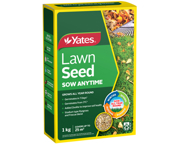Yates Account
Join now
Create a Yates account today!
Sign up to join the Yates Garden Club for monthly e-mails packed with seasonal inspiration, tips for success & exclusive promotions.
Plus if you’re a Garden Club member you can take part in the Yates Growing Community - a blog to share successes, get advice & win prizes in fun challenges along the way!

Forgot password
Enter the email address associated with your account, and we'll email you a new password.

Perennial Ryegrass is widely used in lawn blends, as it's very lush and attractive, establishes fast, is a good companion for other grass types and delivers exceptional resistance to wear and tear.
Ryegrass blends are popular for play areas and heavy traffic zones, being widely used to give quick cover for large-scale planting on playing fields and parks. Perennial ryegrass is the go-to choice for oversowing sports fields in autumn, to prepare for the wear and attrition of winter sports like football.
Perennial ryegrass is vigorous, fills in fast and because it's in active growth through winter it tends to resist lawn diseases and moss better than other grass species. It's an ideal frost-tolerant grass for NZ climates, although it isn't suited to extremes of cold or heat, and won't appreciate anything more than light shade.
Perennial ryegrass has deep, strong roots that allow it to withstand short periods of dry weather, but it isn't as drought tolerant as tall fescue. This root depth also makes it a good choice where erosion control is an issue. It does require lenient mowing – don't go below a 4cm cut for best results.
You may see perennial ryegrass being described as 'diploid' or 'tetraploid'. Normally, perennial ryegrass is diploid, meaning it has the expected two sets of chromosomes. Tetraploid cultivars are selectively bred to have four sets of chromosomes. The main benefit for lawns is that tetraploid seeds have bigger stored energy reserves: this enables them to germinate at a much lower temperature (as low as 3°C) than diploids. Yates Sow Anytime Lawn Seed takes full advantage of this ability.
Ryegrass blends tend to be sown at heavier rates (typically 3-4 kg per 100m2) than most other grasses.
















Share
Share this article on social media